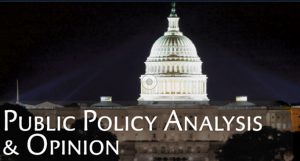Federal legislators ask Federal Insurance
Office to subpoena climate change info
The McCarran-Ferguson Act provided only a limited and contingent loan of Congress’s
constitutional authority to the states. … And Congress could recall the loaned authority at any time.
By Kevin P. Hennosy
On May 23, 2024, 22 Democratic members of the House of Representatives and two Democratic U.S. Senators wrote to the Federal Insurance Office (FIO) of the U.S. Treasury Department and the National Association of Insurance Commissioners (NAIC), concerning data collection relating to the “impact of climate change on insurance costs for homeowners across the country.”
The signatories to the letter were Representatives Earl Blumenauer (D-Ore.), Suzanne Bonamici (D-Ore.), Julia Brownley (D-Calif.), Salud Carbajal (D-Calif.), Tony Cárdenas (D-Calif.), Judy Chu (D-Calif.), Mark DeSaulnier (D-Calif.), Maxwell Alejandro Frost (D-Fla.), John Garamendi (D-Calif.), Jared Huffman (D-Calif.), Ro Khanna (D-Calif.), Summer Lee (D-Pa.), Barbara Lee (D-Calif.), Mike Levin (D-Calif.), Ted W. Lieu (D-Calif.), Doris Matsui (D-Calif.), Kevin Mullin (D-Calif.), Adam Schiff (D-Calif.), Katie Porter (D-Calif.), Mike Thompson (D-Calif.), Jill Tokuda (D-Hawaii), and Bonnie Watson Coleman (D-N.J.); as well as Senator Elizabeth Warren (D-Mass.), and Senator Chris Van Hollen (D-Md.).
Borrowing a phrase from cinematic character Winston Wolf from Pulp Fiction, the federal legislators seemed “none too pleased” with the rollout of the project so far: “[We] urge FIO to use its subpoena power to compel any states who fail to participate voluntarily to submit their data, and the [NAIC] to publish the names of any states that refuse to participate. We also urge you to publish all de-identified reported data for public use.”
Readers will remember that earlier this year, this column reported on the agreement between the FIO and NAIC to move forward on a project included in an Executive Order issued by President Biden on May 20, 2021. The Executive Order envisioned a final report in 120 days.
Then, the lobbyists, pressure groups, and a possible majority of state insurance regulators went to work delaying the launch of data collection. Finally, after three years, the FIO arrived at a deal with the NAIC. The agreement charged the NAIC to gather and “anonymize” insurance company data. The NAIC offered a nationally material—but incomplete—subset of data originally requested by the FIO, the Biden Administration, and influential members of Congress.
In January 2024, at a Senate Banking Committee hearing, Senator Warren called for the Biden Administration to swiftly finalize its data call about the effects of climate change on the insurance market—and to collect all the data necessary to understand our gaps in insurance coverage and the right regulatory response.
After a three-year wait for cooperation, the FIO was willing to declare victory and move ahead with what amounted to partial completion of the project. The Treasury Department issued a statement announcing the agreement with the NAIC as something close to the establishment of Utopia, but it was not.
Again, my last column on this topic noted the NAIC’s role as a data laundry for the insurance carriers and some state insurance regulators: “The participation of the NAIC accomplishes several aims: 1) The FIO will receive the data without protracted litigation; 2) The NAIC asserts that as a private association it is not subject to Freedom of Information Act (FOIA) requirements in any jurisdiction, so raw industry data will not be placed in the public domain; and 3) The NAIC will ‘anonymize’ the data so the FIO will not have the opportunity to study individual companies.”
All too often, the NAIC plays a shell game, which makes the truth disappear. For example, the NAIC turns away FOIA requests on the grounds that the Association is a Delaware-chartered private corporation. At the same time, the NAIC refuses to file the financial disclosure forms required of nonprofit organizations because the association management claims that they are an instrumentality of the states. One can also get lost in a rabbit hole when researching NAIC affiliates and captive research and public policy centers.

The legend and lore surrounding the NAIC made its way to Capitol Hill before the May 23, 2024, congressional letter. We know this because the signatory legislators made clear in the letter that they were not going to accept the NAIC’s shielding nonparticipation by the states or insurers or adulterating the data format.
On June 28, 2024, the NAIC responded to the federal legislators’ letter. In its response to the questions posed in the May 23 letter, the NAIC penned answers in its habitually devious manner. Those proverbial NAIC nutshells began to slide around, hiding truthful answers from the federal legislators.
The legislators’ first bifurcated question asked: “Which states have submitted data for the data call? Which states are not participating?”
The NAIC responded, as follows:
To clarify, states are not submitting data—insurers within the scope of the data call are submitting data directly to the NAIC. PCMI [Property Casualty Market Intelligence] was specifically designed to focus on a particular set of companies relevant to every market across the country, [sic] and was never intended to require every state to sign on to be successful.
The NAIC possesses no authority to issue data calls. To take such action, the NAIC must rely on the authority granted by one or more states. If the NAIC answered the legislators’ questions about state participation, in good faith, the response would present two lists to the federal legislators. The first list would consist of the state jurisdictions that authorized the NAIC to make a data call in their jurisdictions. The second list would consist of states that did not grant the NAIC the authority to issue the data call in their jurisdiction. With that knowledge, the NAIC’s failure to answer the federal legislators’ inquiries appears … contemptuous.
At the very least, the NAIC’s response sounds like a conniving child trying to explain to their mother why they were not doing homework. For example: Well, Mom, I do not have “homework.” My science teacher gave us a “field assignment,” and about three-quarters of the class decided that the teacher would get more than enough answers back without everyone participating.
In another question the legislators asked, “Please provide a copy of the data sharing agreement between NAIC and the states, and between NAIC and FIO.” The NAIC’s answer gets weird.
States made modifications to the template agreement with NAIC to reference state law or authority, so each version is state specific, but the agreements generally provide for the following: The agreements between the NAIC and the states direct the NAIC to conduct the data call on a particular state’s behalf and set out the statutory authority for the state’s participation.
The Agreement calls for company specific responses to be treated as confidential under state law but allows for certain aggregated and anonymized information to be shared with the Federal Insurance Office. Further, the Agreement provides that it does not call for any designation of regulatory authority to the NAIC, that the data collected remains the property of the participating states and directs the NAIC on how to respond to any third-party request for confidential information.
The agreement between the NAIC and FIO sets out the scope and timeline of the provision of data from the NAIC to FIO. Other questions concerning the FIO agreement should be addressed by the Treasury Department.
The NAIC should have answered: “See Attachments 1-56.”
Instead, the NAIC presented the federal legislators with delusional or deceptive answers to completely rational questions, which will probably earn subpoenas for the association and its member insurance regulators. How can the data be filed with the NAIC without being filed with the states, but remain the property of the states?
Alas, the NAIC continues to believe it can live under a Burka of Secrecy. This back and forth could get remarkably interesting. Well, in the wildly interesting realm of insurance regulation.
The federal Representatives and Senators who signed the May 23 letter may begin to think about the fact that under the Constitution, insurance remains under federal jurisdiction under the Commerce Clause.
The McCarran-Ferguson Act provided only a limited and contingent loan of Congress’s constitutional authority to the states. That delegation exists only to the extent the states use the authority to regulate the business of insurance. To the extent the states fail to regulate, that delegation of authority returns to Congress. And Congress could recall the loaned authority at any time.
Something to consider.
The author
Kevin P. Hennosy is an insurance writer who specializes in the history and politics of insurance regulation. He began his insurance career in the regulatory compliance office of Nationwide and then served as public affairs manager for the National Association of Insurance Commissioners (NAIC). Since leaving the NAIC staff, he has written extensively on insurance regulation and testified before the NAIC as a consumer advocate.






